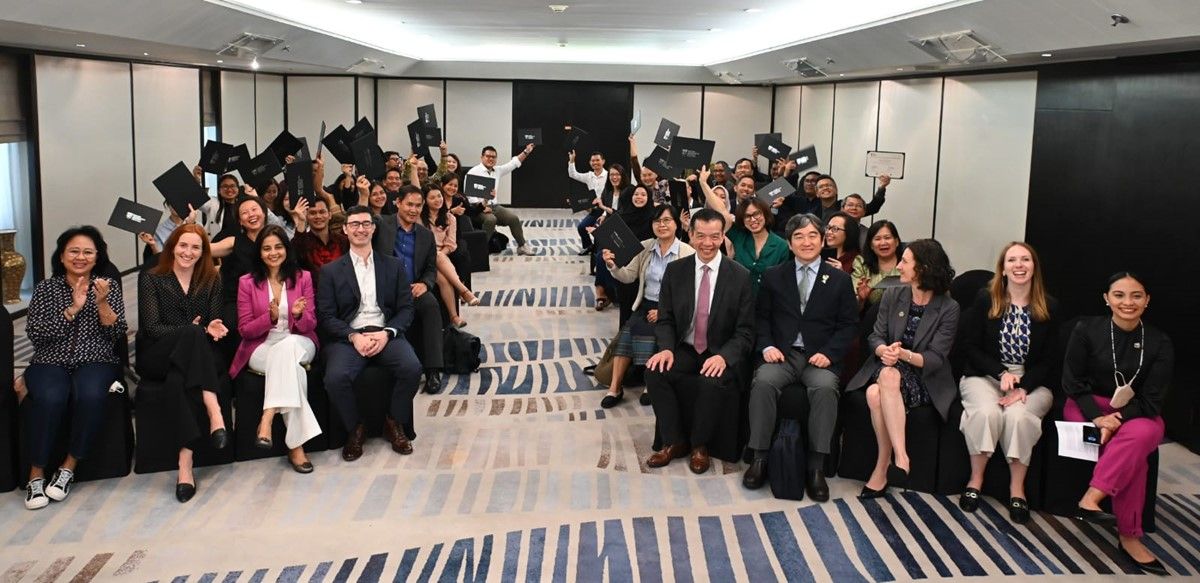
Projects
We support our Corporate Partners in finding innovative solutions to their Challenge Statements across our Focus Areas. Below, you will learn about some of our ongoing and completed co-innovation projects.
[Focus Area: Digitalisation and Automation]Background of the Problem
Globally, 71 million tonnes of oil palm are harvested annually, of which 84% is from two countries alone – Indonesia and Malaysia. Currently, 100% of oil palm is harvested by hand. The process involves people walking through oil palm plantations and using knives on long poles to cut the fruit from the trees. Fruit bunches hit the ground and ‘explode’, and so a second operation is required to collect the fruit bunches and loose fruit (containing the most oil) from the plantation floor.
CNHi has not previously explored a solution for this problem whose consequences for company are significant. The loose fruit is often left to ‘rot’ on the tree due to labour shortages. The situation has worsened due to the COVID-19 pandemic which impacted the availability of migrant labour. Improving harvesting efficiency will maximise yields from current oil palm growing areas. In addition to this, operator safety is currently neglected, which is another issue CNHi hopes to address.
The solutions provider will be working with limited access to infrastructure (such as connectivity and electricity).
Technical Requirements / Performance Criteria
CNHi will be evaluating the solution providers on a case-by-case basis. CNHi will be looking at the following requirements and criteria:
Performance Criteria
- Overall capital expenditure to implement the solution
- Operational expenditure to operate the solution
- The overall Return on Investment (ROI) of the solution
- Safety: Increase in workers safety
- Increased productivity and performance: CNHi will be looking to increase the yield
Technical Criteria
- Initially, CNHi would be looking at a solution that could travel on even land (which represents roughly 50% of the existing cultures)
- Afterwards, the ability to travel over uneven ground between the palm oil trees could be considered as an additional add-on criteria
- The maximum weight of the machine to operate would be 3 to 4 tonnes
- The ability to automatically harvest oil palm fruits, whilst also trying to ensure that the harvest occurs at the point of optimum maturity of the fruit in order to retain its integrity
- The ability to integrate with CNHi’s existing logistics processes
- The ability to operate continuously (24/7)
Cost Target
The cost of the solution will be evaluated on a case-by-case basis. CNHi is looking for a solution that provides a measurable return on investment (ROI). This means that after CNHi’s initial investment and operational expenditure required to implement the solution, they will be looking at a return on investment to justify the outlay. Specifics will depend on the solution provider(s).
Timeframe for Development
Phase 1: Proof of Concept (PoC)/Trial to be conducted (5-6 months).
Phase 2: Further commercial roll-out. Timeline to be discussed on a case-by-case basis.
Potential Market / Business Opportunity
CNHi believes this market to be substantial. If you were to look at approximately 20 million hectares of palm oil plantations as a benchmark number, and if we assume the solution would harvest 50% of the plantations on a yearly capacity of 500 hectares per year, this will represent a volume of 20.000 solutions with CNHi alone.
Resources
- Paid trial support up to S$70,000
- Project management and engineering support through CNHi’s India Technology Centre in New Delhi (the equivalent of S$70,000 in-kind support)
Other Considerations
If the project is successful, CHNi is interested to explore the following potential collaboration opportunities:
- Becoming a launching customer of the startup
- Joint development and potential join IP ownership
- Equity investment in the selected startup (in case of synergy)
- Joint go to market to partners and customers
[Focus Area: Sustainability]
 Participants of the ASEAN Academy on Responsible Investing programme at the concluding ceremony (31 May 2023). Copyright: NTU Singapore.
Participants of the ASEAN Academy on Responsible Investing programme at the concluding ceremony (31 May 2023). Copyright: NTU Singapore.
Southeast Asia has over 60 million hectares of arable land, rich and diverse natural resources and habitats, as well as suitable climates for plant productivity, allowing the region to be one of the most productive agricultural baskets in the world. The region is also home to the most important world suppliers of many agri-commodities, including rubber, palm oil, coconuts, pineapples, rice, and sugar. For example, Indonesia and Malaysia together contribute to an estimated 85% of the world’s palm oil exports. The agriculture sector also accounts for at least 25% of GDP in some member states.
For investors, there is an increasing need to deliver social, economic, and environmental benefits while seeking financial returns. This also makes it crucial for the public and private sector to align goals and synergise for productive investment outcomes while considering potential risks. In 2018, the Association of Southeast Asian Nations (ASEAN) Secretariat published the ‘ASEAN Guidelines on Promoting Responsible Investment in Food, Agriculture and Forestry (FAF)’, creating a framework to guide investors and other relevant stakeholders and encourage the development of private-public partnerships to build a responsible and sustainable agri-food ecosystem.
In this context, through the Singapore Agri-Food Innovation Lab (SAIL) to host the ASEAN Academy on Responsible Investing. Launched in April 2023, the programme aims to offer capacity-building and leadership skills-building for mid-level corporate, government, and non-profit professionals working in sustainable investment in the Food, Agriculture and Forestry (FAF) sectors.
SAIL was launched by NTU in partnership with Enterprise Singapore as a national platform for driving agri-food innovations and to foster an innovation ecosystem in the region. SAIL works with its Corporate Partners in defining their innovation-related Challenge Statements and connects them with Solution Providers from startups, small- and medium-sized enterprises (SMEs), research institutes, and institutes of high learning (IHLs). SAIL’s focus areas are Sustainability; Digitalisation and Automation; Agri-Inputs; and Downstream Research and Development (R&D).
NBS’ expertise in sustainability and agribusiness and SAIL’s focus on the agri-food sector made NTU Singapore an ideal partner for Grow Asia to host the innovative ASEAN Academy on Responsible Investing programme. This programme is supported by Grow Asia’s GrowRight Impact Fund, anchored by the Government of Japan through the Japan-ASEAN Integration Fund (JAIF) and Cargill. It is also supported by the Swiss Agency for Development and Cooperation (SDC).
Professor Boh Wai Fong, Deputy Dean, NBS and co-Director, SAIL, said, “NTU’s innovation in the agri-food tech space has led to the setting up of the Singapore Agri-Food Innovation Lab (SAIL) in 2021. Riding on this momentum, the new training programme under Grow Asia’ new ASEAN Academy will be supported by NTU’s experts to provide a high quality and effective platform for professionals to learn. Through the programme, we hope the participants can go on to pursue successful sustainable investments in regional agrifood, facilitating economic growth for the sector. This is in line with the NTU Sustainability Manifesto, which aims to propel the University’s wide-ranging efforts in sustainability over the next 15 years and solidify its position as a leader in sustainability.”
The four-month pilot programme, facilitated by Surge Consulting Pte. Ltd., ran from February to May 2023. The content was guided by Professor Hafiz Mirza, Lead, Responsible Agricultural Investment Research for the International Institute for Sustainable Development (IISD), who was previously in the three-year program on “Implementation of the ASEAN Guidelines on Promoting Responsible Agricultural Investment in Food, Agriculture, and Forestry.” The curriculum content was also by NBS to ensure a holistic financial knowledge and capability building course tailored to the FAF sector and the ASEAN region for the participants.
Participants were required to complete an online curriculum that is supplemented by workshops and facetime sessions with facilitators. Topics covered under the course included responsible investing leadership, risk management, exploring effective business models and approaches, investing in climate resilience and natural resources, working with smallholders and empowering marginalised groups, food security and building an enabling ecosystem for responsible investing.
Participants were also required to participate in an in-person workshop in Bali, Indonesia. The three-day Bali workshop in March 2023 welcomed professionals in the agri-food sector – from governments, NGOs as well as the private sector. The workshop included a panel discussion that brought together industry experts, sharing how participants could make a positive impact on the agri-food system through responsible investing in the region. A role-playing activity was also conducted to help participants understand perspectives of different actors throughout the agricultural value chain, including farmers from marginalised groups in diverse socioeconomic settings, agri-business owners, village heads, and government officials. The session encouraged multistakeholder conversations, experience sharing, and understanding of the inequalities that exist in the agri-food system.
At the programme’s conclusion in May 2023, the participants gathered in Thailand for the Graduation Ceremony. Through the course, participants were also required to craft a ‘CHANGE’ project using the learnings from the programme, depicting changes in action plans for their own future investment projects. Selected participants were given the opportunity to present their CHANGE project during the event. All 43 graduates were issued a certificate of participation from NTU, commemorating the completion of the inaugural programme at the ASEAN Academy on Responsible Investing.
Moving forward, SAIL and NTU NBS hopes to continue partnering with Grow Asia to promote a sustainable agri-food system in the ASEAN region through training and capacity building, enabling leaders in the ecosystem to invest responsibly.



 Participants of the ASEAN Academy on Responsible Investing programme at the concluding ceremony (31 May 2023). Copyright: NTU Singapore.
Participants of the ASEAN Academy on Responsible Investing programme at the concluding ceremony (31 May 2023). Copyright: NTU Singapore.